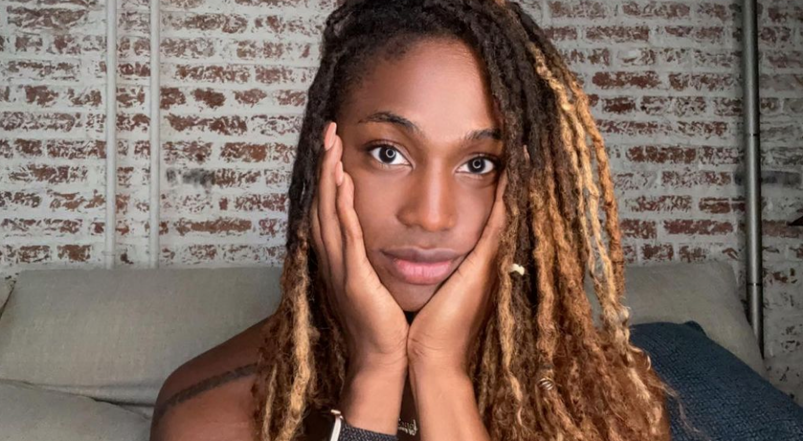
Trigger warning: This story contains content about suicide. If you or someone you know is experiencing suicidal thoughts or has concerns about their mental health, there are ways to get help. Call the National Suicide Prevention Lifeline at 988 or 1-800-273-TALK (8255), or visit www.suicidepreventionlifeline.org.
Suicide Prevention Awareness Week (September 4-10) is bringing light to an often stigmatized and serious topic. Queerty contributor Andrea Marks-Joseph spoke to author and artist Hope Giselle about her self-care strategies, the moment when considering suicide transformed her, and how, through her work with a new campaign called Depression Looks Like Me, she hopes to remind others who may be suffering there is help out there.
“We had these windows that slid all the way open,” recalls Hope Giselle of her freshman dorm room at Alabama State University. “I just remember sitting on my windowsill.”
Giselle had grown up in Miami, which she describes as “a huge melting pot of unique people, fashion, styles, life, sexuality, and gender expression.” The adjustment to the Bible Belt for the transgender student brought with it unexpected bullying and microaggressions.
In response to one of these moments, Giselle experienced suicidal thoughts.
“I was having a really tough time adjusting,” Giselle tells Queerty. “I remember being picked on the entire year and one day just having a breakdown. I walked into the cafeteria, and it felt like everyone was laughing at me. I had posted [on our class Facebook page] about starting the Gay Straight Alliance (GSA) on campus, and someone had taken the flyer that I posted, put my face on it, and said some really derogatory things. I ran back to my room.”
“The only thing that saved me from jumping was that I had spoken to my mother briefly before I walked into the cafeteria,” says Giselle. “Something prompted her to call the Student Life director, who, along with the Head of Admissions, kicked my door in and pulled me out of the window. That was the last time that I ever tried to harm myself.”
Giselle’s experience is far too common. According to the 2015 U.S. Transgender Survey, the largest survey of transgender people to date, “98% of respondents who had experienced four instances of discrimination and violence in the past year thought about suicide that year.”
While Giselle was fortunate to have a supportive family and the experience of growing up in a diverse community, many transgender people face discrimination and mistreatment in various settings, including education, employment, housing, and health care. These factors can lead to depression, and though the solution isn’t a one-size-fits-all, help is out there. Campaigns such as Depression Looks Like Me remind people that they are not alone and that there are resources available if needed.
“One of the reasons I chose to participate in the Depression Looks Like Me campaign is so that others living with depression will see they are not alone.” — Hope Giselle
Giselle, who describes herself as a modern social justice artivist, has been public about her experiences with depression and integrates her passion for fine arts with activism to uplift historically excluded communities.
“A lot of my advocacy work is personally tied to me because I am a part of the group I’ve helped advocate for — be it Black people, Black women, trans folks, or LGBT people as a whole. So I want to let folks know that you can be honest about the fact that sometimes the more fun side doesn’t always put you in a space where you’re mentally okay,” she says. “That is one of the reasons I chose to participate in the Depression Looks Like Me campaign so that others living with depression will see they are not alone.”
Warning Signs for Suicidal Thoughts
One of the most powerful initiatives of Suicide Awareness Prevention Month is equipping family and loved ones to recognize the warning signs. According to the National Alliance on Mental Illness, “suicidal thoughts, much like mental health conditions, can affect anyone regardless of age, gender or background. In fact, suicide is often the result of an untreated mental health condition.”
Some common signs of mental illness include:
- Prolonged or strong feelings of irritability or anger
- Avoiding friends and social activities
- Difficulties understanding or relating to other people
- Changes in sleeping habits or feeling tired and low energy
- Changes in eating habits such as increased hunger or lack of appetite
- Overuse of substances like alcohol or drugs
- Multiple physical ailments without obvious causes (such as headaches, stomach aches, vague and ongoing “aches and pains”)
- Thinking about suicide
- Inability to carry out daily activities or handle daily problems and stress
- Intense fear of weight gain or concern with appearance
While transgender people have many of the same risk factors found in the general population, such as depression and substance use, other minority stressors, including experiences of discrimination, stigma, family rejection, and lack of access to gender-affirming health, may amplify these thoughts.
Fortunately, resources are available for those in need or loved ones concerned about a family member or friend. Healthcare directories, live support, and tailored information for queer BIPOC, trans and elder individuals ensure that anyone seeking assistance can find the help they seek.
Please know you are not alone.
If you or someone you know is struggling emotionally or has concerns about their mental health, there are ways to get help. Call the National Suicide Prevention Lifeline at 988 or 1-800-273-TALK (8255), or visit www.suicidepreventionlifeline.org.
Understanding Depression
Over the years, Giselle has grown to understand her depression better and proactively makes decisions to support her mental health.
“I’ve learned to allow myself to feel tired on the days that I feel sad, allow myself anger when I feel anger, allow myself to cry, and allow myself to vocalize that to the people that I love,” says Giselle. “Instead of walking away from everyone, I’ve learned that it is okay to say, ‘Hey, these last couple of weeks have not been easy for me. For the next couple of days, I’m going to be a little tough to reach, but I’m okay.’ I’ve been able to feel a lot more comfortable saying that I am depressed or that I am sad. The younger me would have never been able to do that.”
“Owning your power, whatever that power might be, is the most important thing we can do right now. Pour yourself into the things that affirm you and make you feel the best about yourself.” — Hope Giselle
Through her nonprofit movement #AllowMe, Giselle pairs queer youth of color with community leaders and creators to establish self-worth and tackle some of the systemic issues that may contribute to poor mental health.
“Owning your power, whatever that power might be, is the most important thing we can do right now,” is Gisell’s message to the Black trans community, specifically trans women who might be navigating depression. “Pour yourself into the things that affirm you and make you feel the best about yourself so you can go out into the world and spread that energy to other people who may not have the strength to do so on their own. Together, we can make a difference. We can ensure no one else feels alone or stifled not to share their true selves with the world!”
Giselle also suggests being more thoughtful in the narratives we choose to focus on.
“Within the queer community, people love to pass on the information of tragedy and trauma to their queer friends without checking in with us to see if we are okay to receive that information,” says Giselle. “Especially when you have friends who have had bouts with depression, make sure you’re checking in about everything that you pour onto their plate. Practice being mindful and remember depression doesn’t discriminate. Even if it isn’t always visible, depression can affect any and all facets of life. But together, we can join our voices to help erase the stigma associated with depression and show that our stories matter.”
* * *
Depression is an illness like any other. Access to information and resources is the first step toward seeking help. Healthcare and provider directories, LGBTQ community centers, mental health, suicide hotlines, and resources specifically for our BIPOC and trans communities, as well as campaigns like Depression Looks Like Me, can empower those in need.
Editor’s note: This article mentions suicide. If you need to talk to someone now, call Trans Lifeline at 1-877-565-8860. It’s staffed by trans people, for trans people. The LGBT National Hotline provides telephone, online chat, and email peer support at 888-843-4564 or www.lgbthotline.org. You can also call the National Suicide Prevention Lifeline at 988 or 1-800-273-8255.
Andrea Marks-Joseph is a South African freelance writer whose work celebrates queer culture, champions creators of color, and explores the entertainment landscape from a marginalized perspective. Find her online everywhere as @stargirlriots and at stargirlriots.com

















